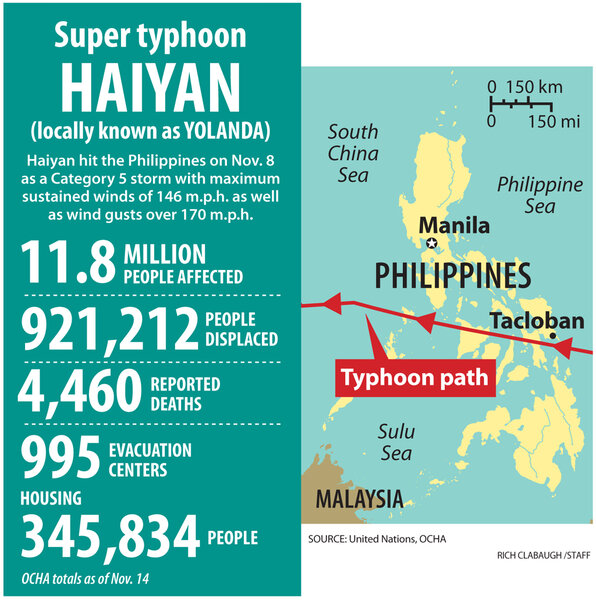Slammed for being stingy, China boosts aid to Philippines
| Beijing
China promised to send $1.6 million in relief supplies to The Philippines on Thursday, following intense criticism for playing politics when it offered only $100,000 cash earlier in the week to aid in the aftermath of typhoon Haiyan.
The Chinese Ministry of Foreign Affairs announced the government would send 10 million yuan ($1.64 million), adding to the initial cash pledge from Monday. President Xi Jinping also reportedly called Filipino President Benigno Aquino III on Wednesday to offer condolences, Chinese state media reported.
“May the Filipino people overcome the disaster and rebuild their homeland at an early date,” Mr. Xi told Mr. Aquino.
The Philippines has been locked in a dispute with China over the emerging superpower’s growing reach and territorial claims in the South China Sea. Philippines officials have protested China’s increasingly aggressive moves to assert its claim to several disputed ocean territories. Last year, Aquino signed an order asking the United Nations to rename the body the “West Philippines Sea,” in response.
Adding to the tension between the two countries is the outrage still festering in Hong Kong over a deadly end of a hostage standoff three years ago. Hong Kong’s legislature last month threatened economic sanctions against the Philippines for failing to properly apologize for the incident in which a policeman who had been fired killed eight tourists in 2010.
When news began to emerge over the weekend that typhoon Haiyan had killed thousands in The Philippines, speculation started over whether China would participate in relief efforts. The initial small cash donation touched off a wave of criticism.
China’s cash donation is the same as Korean figure skater Kim Yu-na's pledge. Several international companies, including Samsung and HSBC, have pledged $1 million in cash aid.
China’s own media urged the government to lay aside political disputes, in large part to avoid tarnishing the country’s image.
“China, as a responsible power, should participate in relief operations to assist a disaster-stricken neighboring country, no matter whether it's friendly or not,” the nationalistic Global Times wrote in an editorial. “China's international image is of vital importance to its interests. If it snubs Manila this time, China will suffer great losses.”
Online commentators weighed in as well. "Weibo" microblogs were crowded this week with divergent opinions on the matter, with vociferous opinions for and against giving aid to a country with which China has political problems. Some postings offered measured responses as well.
"Foreign aid should be different depending on the closeness of the relations. Foreign relations should be based on the state interests," wrote a user under the name Ba Da Shang Ren.
China is reluctant to disclose its foreign aid and is rarely a first responder when it comes to international disaster relief efforts. The government has invested billions of dollars in developing countries in health aid to build hospitals and other facilities, but deals usually are made alongside business contracts.







